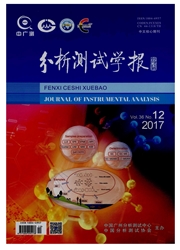

 中文摘要:
中文摘要:
设计并合成了核因子NF—κB的特异结合DNA序列探针,在其5’端巯基化修饰后固定在基频10MHz的石英晶体金膜表面,构建压电DNA-蛋白质相互作用生物传感器,研究了传感器的响应特性及NF-κB的p65蛋白亚基与其特异DNA结合的亲和常数Ka。DNA探针浓度在0.25—2.0μmol/L范围内,随着探针浓度的增加,传感器的响应频率逐渐增大,当探针浓度超过2.0μmol/L时,传感器的响应频率反而降低;反应缓冲液镁离子浓度、pH对p65蛋白亚基与其特异DNA结合有影响,当MgCl2浓度为50mmol/L、pH7.5时,p65蛋白亚基与其特异DNA结合引起的传感器响应频率最大;在p65质量浓度为10—40mg/L时,结合反应引起的频率变化与p65质量浓度呈线性相关,检测批内相对标准偏差(RSD)小于5%,批间RSD小于10%,最大结合量和结合常数Ka分别为(49.6±1.5)ng和(3.92±0.14)×10^6L·mol^-1。构建的压电DNA-蛋白质相互作用生物传感器具有结构简单、操作方便、不需标记、实时检测等优点,可直接用于核因子NF—κB与DNA的相互作用研究。
 英文摘要:
英文摘要:
The interaction of nuclear factor NF-κB with its specific binding DNA was studied by the self-constructed piezoelectric biosensor (PB). The specific DNA probe binded to nuclear factor NF-κB was modified by the sulfhydryl group on the 5' extreme, and immobilized on the gold coated surface of 10 MHz piezoelectric quartz crystal. The effects of DNA probe concentration, Mg^2+ concentration and pH of buffer solution on the response frequency of PB were studied. The results indicated that the response frequency of PB increased gradually with the increase of DNA probe concentration within the range of 0. 25 - 2.0 μmol/L, but decreased with probe concentration above 2.0 μmol/L. The Mg^2+ concentration and pH of reaction buffer could influence the specific binding reaction between p65 subunit and its specific DNA. At pH 7.5 and 50 mmol/L MgCl2, a maximum response frequency of PB could be obtained. Under optimum conditions, the response frequency of PB varied linearly with p65 subunit concentrations in the range of 10 -40 mg/L with intra-RSD less than 5% and inter-RSD less than 10% , respectively. The binding parameters of p65 subunit with its specific binding DNA were also calculated. The results showed that the maximum binding capacity( △mmax ) and the binding constant(Ka) were(49.6 ± 1.5) ng and (3.92 ±0. 14) × 10^6 L.mol^-1, respectively. The proposed PB is highly sensitive, easy to operate, free-labelling and real-time detection.
 同期刊论文项目
同期刊论文项目
 同项目期刊论文
同项目期刊论文
 期刊信息
期刊信息
